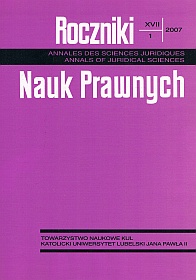Cultural Identity of the European Union versus Religious Pluralism
Abstract
The European Union has no fully developed mechanism of collective memory, unlike national states. The Union has its history now, but this history is not common to all of the member states, and as such cannot be treated as the foundation for European identity.
This article aims to demonstrate the relationship between the cultural identity of the European Union and religious pluralism. Broadly understood, religion is the foundation of culture. It shapes the world view, and it explains the cause and way the world was created. It also interprets human fate, being the source of values for a believer, the observance of which constitutes a guarantee of what happens at death. Cultural changes involve religious ones, although their direction is not clear. Neither is it obvious what the distinction between cause and effect is. Nevertheless, it is undoubtedly interesting to note that certain foundations of the European culture and its specific features are associated with Christianity, or more broadly, with the Judeo-Christian tradition.
The unity of Europe is a unity of pluralistic European culture. Democratic principles, human rights and Christian values present in multicultural Europe may be a solid point of reference when building a European identity.
Copyright (c) 2007 Roczniki Nauk Prawnych

This work is licensed under a Creative Commons Attribution-NonCommercial-NoDerivatives 4.0 International License.


